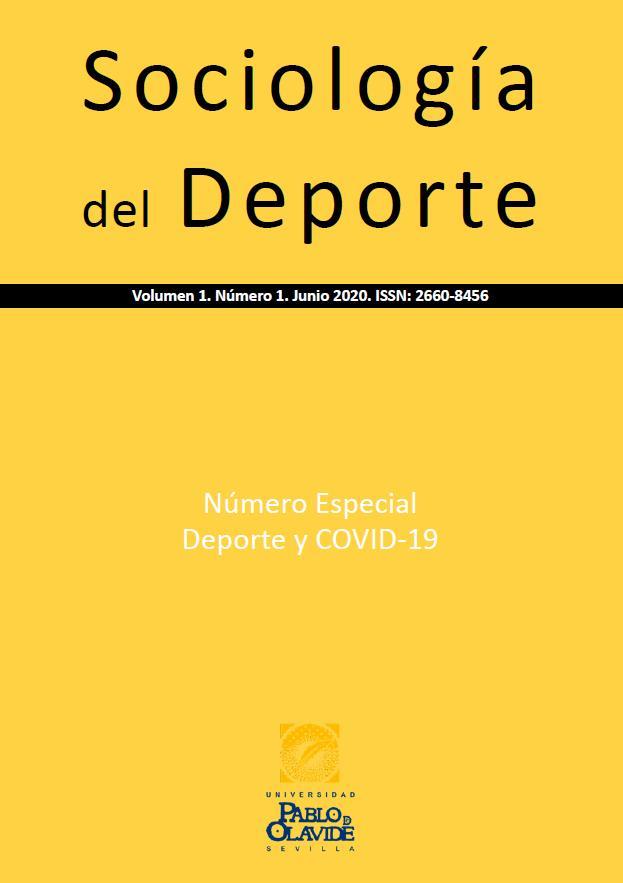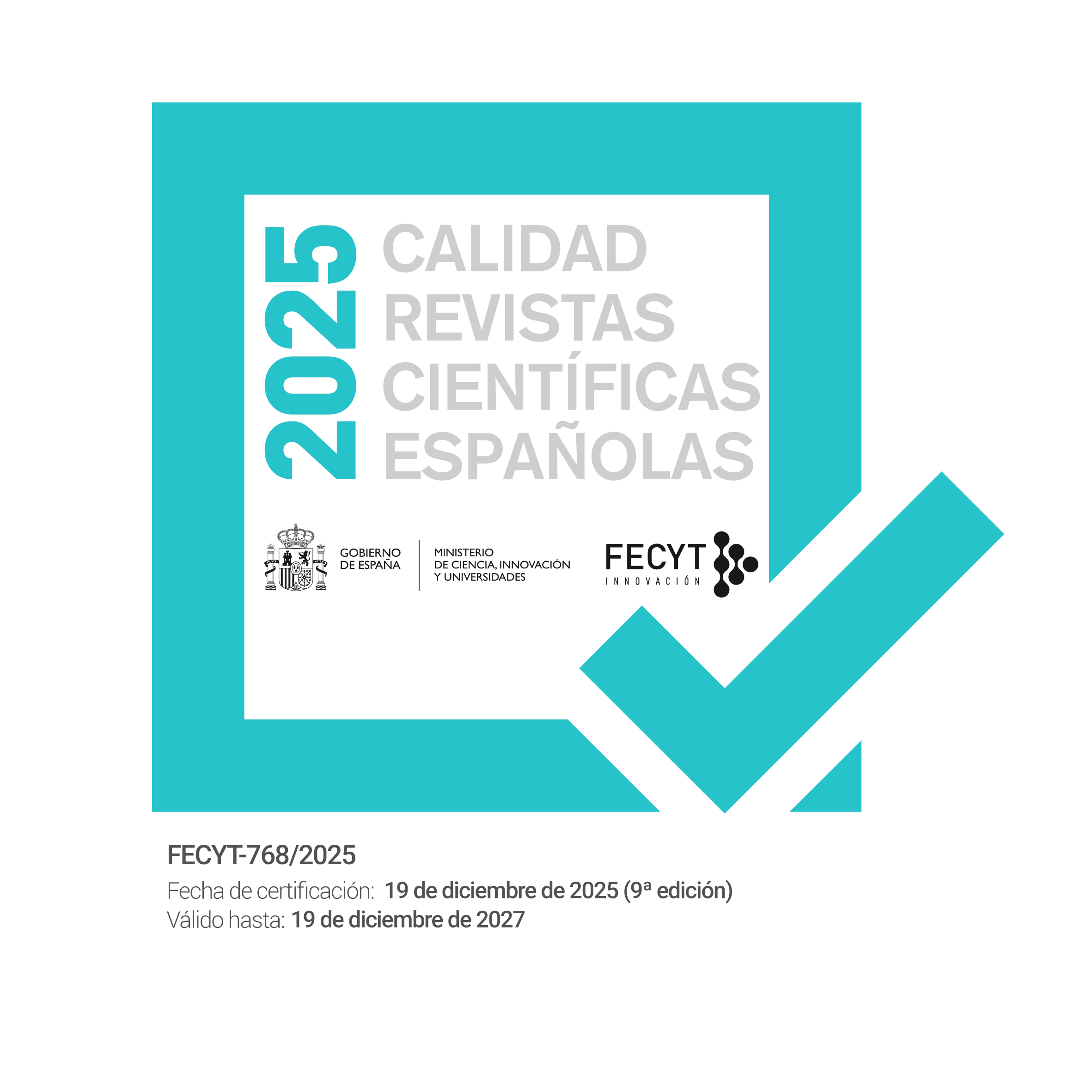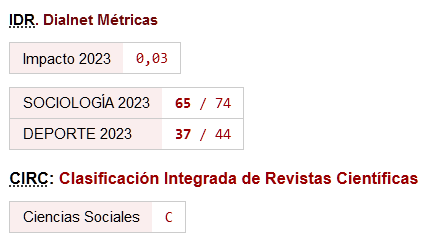El rol de la frustración y otras emociones negativas en las conductas ilícitas asociadas a la competición deportiva
Un estudio empírico con una muestra de deportistas en activo.
DOI:
https://doi.org/10.46661/socioldeporte.4971Palabras clave:
Bloqueo de oportunidades, Emociones negativas, Infracciones en la competición deportiva, Análisis de mediaciónResumen
En este estudio evaluamos las posibles causas subyacentes a ciertas infracciones que se producen en el ámbito de la práctica deportiva. Para ello, tomamos como marco teórico de referencia las propuestas de las teorías de la frustración. Estas teorías, en sus versiones clásicas, pronostican que las causas de ciertas conductas desviadas están en la falta de oportunidades que sufren algunas personas. Sin embargo, las versiones contemporáneas de estas teorías mantienen que la relación entre frustración y desviación es indirecta. Esto es, a través de ciertas emociones negativas (Agnew 1992). En este estudio se utilizan datos de una encuesta a deportistas en activo (n=349) que proporciona información sobre emociones negativas. Un análisis factorial revela dos variables latentes que se identifican con emociones negativas previas y posteriores a la competición. Un conjunto de análisis mediación con la herramienta PROCESS Versión 3.4.1 (Hayes 2018) informa que solo las emociones negativas posteriores a la competición tienen efectos mediadores. Se analizan y discuten los resultados.
Descargas
Citas
Agnew, Robert. 1984. "Goal Achievement and Delinquency." Sociology & Social Research 68 (4): 435-451.
Agnew, Robert. 1992. "Foundation for a General Strain Theory of Crime and Delinquency." Criminology 30 (1): 47-88.
Agnew, Robert. 1997. "Introduction." En The Future of Anomie Theory, editado por Passas Agnew N. y Nikos Passas, 1-26. Boston: Northeastern University Press.
Agnew, Robert. 2005. Why do Criminals Offend?: A General Theory of Crime and Delinquency. Los Angeles, CA: Roxbury.
Agnew, Robert. 2007. Pressured into Crime: An Overview of General Strain Theory. USA: Oxford University Press.
Aseltine Jr, Robert H., Susan Gore y Jennifer Gordon. 2000. “Life Stress, Anger and Anxiety, and Delinquency: An Empirical Test of General Strain Theory,” Journal of health and social behavior 41 (3): 256–75.
Bandalos, Deborah L. y Sara J. Finney. 2018. "Factor Analysis: Exploratory and Confirmatory." En The Reviewer’s Guide to Quantitative Methods in the Social Sciences, editado por Gregory R. Hancock y Ralph O. Mueller, 98-122. New York: Routledge.
Bao, Wan-Ning, Ain Haas y Yijun Pi. 2004. "Life Strain, Negative Emotions, and Delinquency: An Empirical Test of General Strain Theory in the People’s Republic of China." International Journal of Offender Therapy and Comparative Criminology 48 (3): 281-297.
Baron, Reuben M. y David A. Kenny. 1986. "The Moderator–Mediator Variable Distinction in Social Psychological Research: Conceptual, Strategic, and Statistical Considerations." Journal of Personality and Social Psychology 51 (6): 1173-1182.
Baron, Stephen W. 2009. "Street Youths' Violent Responses to Violent Personal, Vicarious, and Anticipated Strain." Journal of Criminal Justice 37 (5): 442-451.
Bevan, S., Baumgartner, F. R., Johnson, E. W., y McCarthy, J. D. 2013. “Understanding selection bias, time-lags and measurement bias in secondary data sources: Putting the Encyclopedia of Associations database in broader context.” Social science research, 42 (6): 1750-1764.
Broidy, Lisa M. 2001. "A Test of General Strain Theory." Criminology 39 (1): 9-36.
Burton Jr, Velmer S. y Francis T. Cullen. 1992. "The Empirical Status of Strain Theory." Journal of Crime and Justice 15 (2): 1-30.
Cloward, Richard A, y Lloyd E Ohlin. 1960. Delinquency and Opportunity: A Study of Delinquent Gangs. Routledge.
Cohen, Albert K. 1955. Delinquent Boys. The Culture of the Gang. New York: Free Press.
Connor, James M. 2009. "Towards a Sociology of Drugs in Sport." Sport in Society 12 (3): 327-328.
Cornish, Derek B. y Ronald V. Clarke. 1986. The Reasoning Criminal: Rational Choice Perspectives on Offending. New York: Springer-Verlag.
Durkheim, Emile. [1897]1998. El Suicidio, Introducción y Estudio previo de Lorenzo Díaz Sánchez. 5th ed. Madrid: Ediciones Akal.
Featherstone, Richard y Mathieu Deflem. 2003. "Anomie and Strain: Context and Consequences of Merton's Two Theories." Sociological Inquiry 73 (4): 471-489.
Gaskin, Cadeyrn J. y Brenda Happell. 2014. "On Exploratory Factor Analysis: A Review of Recent Evidence, an Assessment of Current Practice, and Recommendations for Future Use." International Journal of Nursing Studies 51 (3): 511-521.
Hayes, Andrew F. 2013. Introduction to Mediation, Moderation, and Conditional Process Analysis: A Regression-Based Approach. New York; London: The Guilford Press.
Hayes, Andrew F. 2018. Introduction to Mediation, Moderation, and Conditional Process Analysis: A Regression-Based Approach. 2ª ed. New York; London: The Guilford press.
Hirschi, Travis. 1969. Causes of Delinquency. New Brunswick, N.J: Transaction publishers.
Jang, Sung Joon y Byron R. Johnson. 2003. "Strain, Negative Emotions, and Deviant Coping among African Americans: A Test of General Strain Theory." Journal of Quantitative Criminology 19 (1): 79-105.
Lloret-Segura, S., Ferreres-Traver, A., Hernández-Baeza, A. y Tomás-Marco, I. 2014. “El análisis factorial exploratorio de los ítems: una guía práctica, revisada y actualizada” Anales de Psicología/Annals of Psychology 30 (3): 1151-1169.
Lorenzo-Seva, Urbano y Ferrando, Pere J. 2015. “POLYMAT-C: A comprehensive SPSS program for computing the polychoric correlation matrix” Behavior research methods 47 (3): 884-889.
MacKinnon, David P., Jennifer L. Krull y Chondra M. Lockwood. 2000. "Equivalence of the Mediation, Confounding and Suppression Effect." Prevention Science 1 (4): 173-181.
Manasse, Michelle E. y Natasha M. Ganem. 2009. “Victimization as a cause of delinquency: The role of depression and gender” Journal of Criminal Justice 37 (4): 371–378.
Mazerolle, Paul, Velmer S. Burton Jr, Francis T. Cullen, T. David Evans, y Gary L. Payne. 2000. "Strain, Anger, and Delinquent Adaptations Specifying General Strain Theory." Journal of Criminal Justice 28 (2): 89-101.
Menard, Scott. 1995. "A Developmental Test of Mertonian Anomie Theory." Journal of Research in Crime and Delinquency 32 (2): 136-174.
Méndez Martínez, Carolina y Martín Alonso Rondón Sepúlveda. 2012. "Introducción al Análisis Factorial Exploratorio." Revista Colombiana de Psiquiatría 41 (1): 197-207.
Merton, Robert K. 1938. "Social Structure and Anomie." American Sociological Review 3 (5): 672-682.
Messner, Steven F. 1988. "Merton's “Social Structure and Anomie”: The Road Not Taken." Deviant Behavior 9 (1): 33-53.
Moon, Byongook, David Blurton y John D. McCluskey. 2008. "General Strain Theory and Delinquency: Focusing on the Influences of Key Strain Characteristics on Delinquency." Crime & Delinquency 54 (4): 582-613.
Mooney, Christopher Z. y Robert D. Duval. 1993. Bootstrapping: A Nonparametric Approach to Statistical Inference. Los Ángeles, CA: Sage Publications.
Robles Rodríguez, José, Manuel T. Abad Robles y Francisco J. Giménez Fuentes-Guerra 2009. “Concepto, características, orientaciones y clasificaciones del deporte actual” Revista Digital 14 (138). Acceso 20 de junio de 2020. https://www.efdeportes.com/efd138/concepto-y-clasificaciones-del-deporte-actual.htm
Sanchez García, Raul y Giolo Fele. 2015. “Normatividad en deporte: una reespecificación etnometodológica.” EMPIRIA. Revista de Metodología de las Ciencias Sociales (30): 13-31.
Serrano Maíllo, Alfonso y Marco Teijón Alcalá. 2019. "Efectos Indirectos de la Frustración sobre la Desviación en el Ámbito Deportivo Profesional y Semiprofesional. Un Enfoque de Ecuaciones Estructurales." Revista Electrónica de Criminología 1 (4): 1-11.
Serrano-Maíllo, Alfonso. 2018. "Crime Contemplation and Self-Control: A Test of Situational Action Theory’s Hypothesis about their Interaction in Crime Causation." European Journal of Criminology 15 (1): 93-110.
Sigfusdottir, Inga-Dora, George Farkas y Eric Silver. 2004. "The Role of Depressed Mood and Anger in the Relationship between Family Conflict and Delinquent Behavior." Journal of Youth and Adolescence 33 (6): 509-522.
Sun, Ivan Y., Haishan Luo, Yuning Wu y Wen-Hsu Lin. 2016. "Strain, Negative Emotions, and Level of Criminality among Chinese Incarcerated Women." International Journal of Offender Therapy and Comparative Criminology 60 (7): 828-846.
Teijón-Alcalá, Marco. 2018. “Anomia, Frustración y Delitio: Una Propuesta de Medición para la Variable Principal de las Teorías Clásicas de la Frustración,” Revista electrónica de ciencia penal y criminología 20 (7): 1–17.
Teijón-Alcalá, Marco y Alfonso Serrano Maíllo. 2019. "Bloqueo de Oportunidades y Emociones Negativas en la Causación del Delito. Un Test de la Teoría General de la Frustración." Cuadernos de Política Criminal 127 (I): 177-201.
Teijón-Alcalá, Marco y Manuel Sillero Quintana. 2018. "Anomia, Frustración y Desviación." Indret: Revista para el Análisis del Derecho (3): 1-22.
Tittle, Charles R. 1969. "Crime Rates and Legal Sanctions." Social Problems 16 (4): 409-423.
Ward, P., Clark, T., Zabriskie, R., y Morris, T. 2014. “Paper/pencil versus online data collection: An exploratory study” Journal of Leisure Research, 46 (1): 84-105.
Yukhymenko-Lescroart, Mariya A. 2015. "Is Winning the Only Thing? Development of the Conduct in Sport Toward Opponents Scale (CSOS)." Athletic Insight 7 (1): 19-32.
Zhao, Xinshu, John G. Lynch Jr, y Qimei Chen. 2010. "Reconsidering Baron and Kenny: Myths and Truths about Mediation Analysis." Journal of Consumer Research 37 (2): 197-206.

Descargas
Publicado
Cómo citar
Número
Sección
Licencia
Derechos de autor 2020 Marco Teijon

Esta obra está bajo una licencia internacional Creative Commons Atribución-NoComercial-CompartirIgual 4.0.









